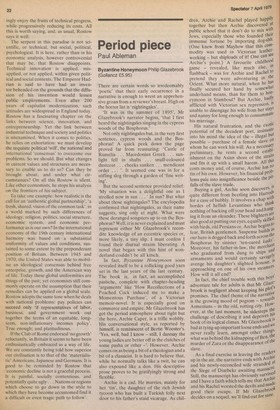Period piece
Paul Ableman
Byzantine Honeymoon Philip Glazebrook (Gollancz £5.95) There are certain words so irredeemably 'poetic' that their early occurrence in a narrative is enough to wrest an apprehensive groan from a reviewer's breast. High on the horror list is 'nightingales'.
'It was in the summer of 1895', Mr Glazebrook's narrator begins, 'that I first heard the nightingales singing in the cypress woods of the Bosphorus.'
Not only nightingales but, in the very first sentence, cypress woods and the Bosphorus! A quick peek down the page proved far from reassuring: 'Castle of Rumelia . . . Macedonian Greek . . . sunlight fell in shafts . . . snuff-coloured dustcoat . . . cheeks sunken . . . mendicant order . . . '. It seemed one was in for a stifling slog through a garden of 'fine writing'.
But the second sentence provided relief: 'My situation was a delightful one as I strolled now in sun . . . ' In sun? But what about those nightingales? The encylopedia confirmed that nightingales, as their name suggests, sing only at night. What were these deranged songsters up to on the Bosphorus? Well, it is never explained and must represent either Mr Glazebrook's recondite knowledge Of an eccentric species or, more likely, a tiny slip. I must confess I found their diurnal strains liberating. A novel that began with this hint of wonderland couldn't be all kitsch.
In fact, Byzantine Honeymoon soon revealed itself to be a rollicking good yarn set in the last years of the last century. The book is, in fact, an accomplished pastiche, complete with chapter-heading 'arguments' like 'How Recollections of a Poached Cock induced me to make a Momentous Purchase', of a Victorian memoir-novel. It is especially good on commerce and empire. Mr Glazebrook has got the period atmosphere about right but the hero, Archie Caper, is a trifle wobbly. His conversational style, as reported by himself, is reminiscent of Bettie Wooster's. 'Yes, well, bad I know — still, I daresay the young ladies are better off in the clutches of some pasha or other —'. However, Archie comes on as being a bit of a theologian and a bit of a classicist. It is hard to believe that, while he normally talks like a twit, he can also expound like a don. His descriptive prose proves to be gratifyingly strong and flexible.
Archie is a cad. He marries, mainly for her 'tin', the daughter of the rich Jewish tycoon who has built a Turkish folly next door to his father's staid vicarage. As chil dren, Archie and Rachel played happilY together but then Archie discovered public school that it don't do to mix with Jews, especially those who founded their immense fortune by importing dog-shit. (One knew from Mayhew that this commodity was used in Victorian leatherworking — but shiploads of it! One can see Archie's point.) A favourite childhood game — revealed, like much else, io flashback — was for Archie and Rachel to pretend they were adventuring in the Orient. What More natural, when he has finally secured her hand by somewhat underhand means, than for them to honeymoon in Stamboul? But Archie, badly afflicted with Victorian sex repression, is unable to disengage his wife from her stays and nanny for long enough to consummate his marriage. His natural frustration, and the exotic potential of the decadent port, insinuate into his mind the idea of the — illegal but possible — purchase of a female slave oil whom he can work his will. As a necessarY preliminary, he rents a second establishment on the Asian shore of the straits and fits it up with a small harem. All this costs money and, of course, Archie has p0 tin of his own. However, his financial problems pale into insignificance beside the pitfalls of the slave trade. Buying a girl, Archie soon discovers, iS quite different from beetling into Harrods for a case of bubbly. It involves a chap with hordes of hellish Levantines who think nothing of hacking off your head and hang' ing it from an oleander. These blighters are also good at putting out eyes, equally skilled with birds, old Persians or, Archie begins t° fear, British gentlemen. Suspense builds as our hero is dogged back and forth across the Bosphorus by sinister 'ten-oared kaiks'' Moreover, . his father-in-law, the merchant, who graduated from dung to ships an' armaments and would certainly savagelY avenge his daughter's slighted honour, is approaching on one of his own steamers' How will it all end? In fact, the chief trouble with this boys adventure tale for adults is that Mr Glazebrook is negligent about keeping his plot's promises. The chief theme of the narrative is the growing mood of pogrom — towards Armenians — in the old, rotting city. HO ever, at the last moment, he sidesteps the challenge of describing it and deprives his book of its logical climax. Mr Glazebrook is bad at tying-up important loose ends and we never really learn, amongst other things, what was behind the kidnapping of Ben, the murder of Zara or the disappearance of the slave.
As a final exercise in leaving the readers up in the air, the narrative ends with Archie and his newly-reconciled wife stranded at the Siege of Diarbekr awaiting massacre.; Still, the manuscript has obviously survive! and I have a faith which tells me that Archie and his Rachel worsted the devils and made good their escape. If Mr Glazebrook decides on a sequel, we'll find out for sure.


































 Previous page
Previous page